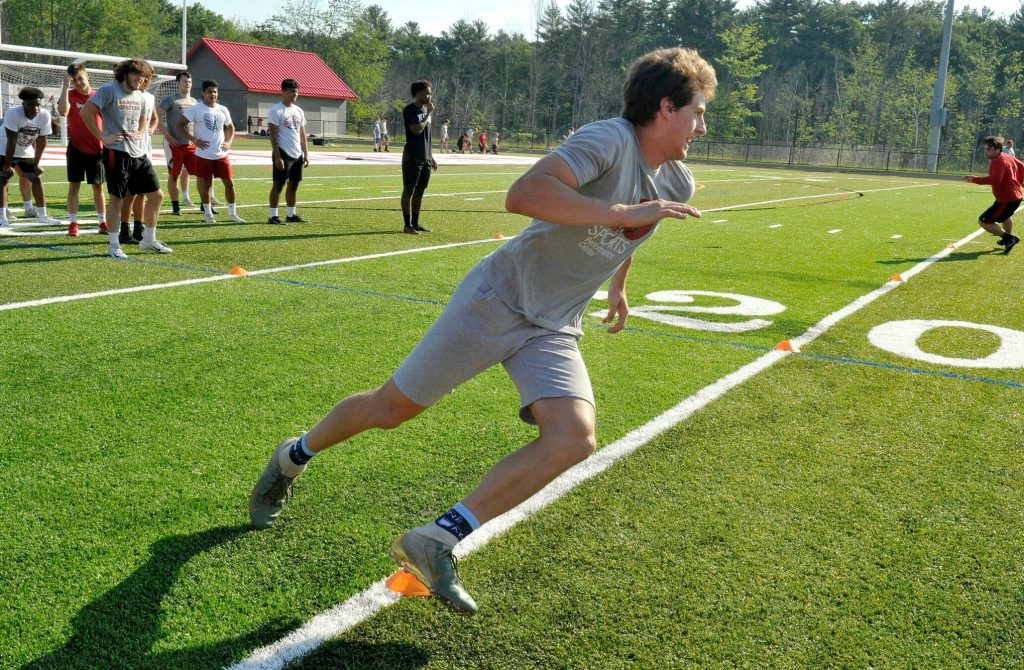SANFORD — It’s 7:30 in the morning and the temperature is already into the 70s as about 100 high school athletes gather on the artificial turf field at Sanford High.
They are running and jumping, cutting and darting, pulling on resistance bands, twisting and swiveling, stretching and reaching. And they wouldn’t be anywhere else.
“It’s actually not that bad,” said Mollie Hludik, a junior soccer player at Sanford. “Once you get out here, you wake up. And you’re with your friends.”
The athletes are participating in a seven-week summer training program offered by the Southern Maine Health Care Sports Performance Centers in Saco and Sanford. The program is offered free to students from the six high schools that are served by trainers from SMHC.
Students from Thornton Academy, Biddeford and Old Orchard Beach train twice a week for 75 minutes at Thornton Academy, and students from Sanford, Massabesic and Wells meet twice a week at Sanford High. The program is in its fifth year in Saco and third in Sanford.
“For us, it’s a huge community giveback,” said Rick Sirois, the manager of Saco’s Sports Performance Center and a 1998 graduate of Thornton, where he was the athletic trainer for four years. “We’re providing a service for kids who maybe aren’t able to get it elsewhere. This is a great opportunity for us to give back to these athletic programs.”
A similar training program likely would cost $150-$225, Sirois said.
The athletes feel they’re in better shape physically and mentally when the program ends – shortly before the start of fall sports practices – and their coaches can see the improvement.
“There’s no mystery that if you work hard you have more success on the field, the court, the diamond, wherever it might be,” said Sanford football coach Mike Fallon. “This is the way of athletics now. The thought of just showing up on the first day of the season? I mean you can do it, but you’re going to have limited success, if you have any success. And this goes a long way toward injury prevention because the kids are properly trained.”
There are about 150 students enrolled in both sessions in Saco and Sanford. The athletes are overseen by staff members from SMHC and coaches. The students are tested on the first day to determine their appropriate level of training and then broken up into smaller groups. While the program was primarily attended by male athletes in the early years, it is now split fairly evenly among boys and girls.
Sanford softball coach Mike Bailey said he has about 14 players who regular attend the sessions. “One thing I like is that they’re training together,” he said. “It’s small groups but you’re building cohesiveness in the offseason.”
“My whole soccer team is here,” said Hludik. “And we’re creating a bond working out with each other early in the morning. Going into the season, it helps with our speed but also, because we’re working in the summer heat, with our conditioning.”
Kate Waldron, a strength and conditioning specialist in Sanford, oversees the older male athletes. On Wednesday, she had them running agility drills to improve their ability to cut and accelerate. She also tries to make the drills competitive, often turning them into races.
“Oh yeah, they unleash the competitive aspect,” said Grace Curley, a senior volleyball and softball player at Sanford. “You definitely want to win.”
“There’s nothing else like this,” said Leyton Bickford, a senior basketball player at Sanford who verbally has committed to play at UMaine. “A lot of summer programs are just about lifting. This adds a new component in speed and agility. … They actually focus on your footwork and getting faster by utilizing your footwork.”
“You can’t get this anywhere else,” said Ali Ibrahim, a senior football and basketball player at Sanford.
Bickford said the program has made him a better one-on-one defender because of its attention to footwork and quickness. Paige Cote, a senior basketball player for the Spartans who verbally has committed to the University of New Hampshire, agreed. “It’s helped transform my game a lot in terms of quickness and agility,” she said.
Waldron said the program is getting bigger each year.
“This really is big for our community giveback,” she said. “We’re working with our community athletes, we’re hoping to prevent injuries and we’re working on a little bit of conditioning, a little bit of agility. And we’re just spending some time with them.”
Send questions/comments to the editors.









